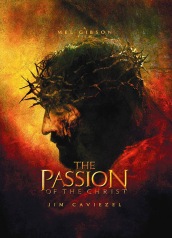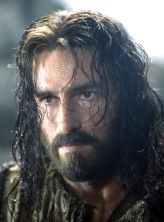| The Passion of the Christ |
| |
 |
USA, 2004. Rated R. 126 minutes.
Cast:
Jim Caviezel, Maia Morgenstern, Monica Bellucci, Rosalinda Celentano, Mattia Sbragia, Hristo Naumov Shopov , Hristo Jivkov, Luca Lionello
Writers: Benedict Fitzgerald, Mel Gibson
Original Music: John Debney
Cinematography: Caleb Deschanel
Producers: Bruce Davey, Mel Gibson, Steven McEveety
Director: Mel Gibson
LINKS
|
 he Passion of the Christ is whatever you want it to be: anti-Semitic, sadistically violent, a spiritual masterpiece, an actor's showcase, a repulsive gore-fest, an urgent reminder to the Christian faith, a film that appeals to none but the Christian niche—a great movie, or a dire one. What side of the fence you land on depends on what you bring to this film. I came in with baggage of my own, my religion, so it would be hypocritical of me to advise you to be objective.
he Passion of the Christ is whatever you want it to be: anti-Semitic, sadistically violent, a spiritual masterpiece, an actor's showcase, a repulsive gore-fest, an urgent reminder to the Christian faith, a film that appeals to none but the Christian niche—a great movie, or a dire one. What side of the fence you land on depends on what you bring to this film. I came in with baggage of my own, my religion, so it would be hypocritical of me to advise you to be objective.
Now let's set aside that baggage and talk about The Passion of the Christ as a film. As a film it is, without doubt, one of the best pictures of the Biblical genre. Though it may truly resonate only with Christians, The Passion is one of the few works of Christian cinema made with genuine artistry. Director and co-writer Mel Gibson is not afraid of an honest depiction of violence, cruelty and evil, with an artistic daring that is often absent among Christian filmmakers who tread lightly so as to avoid giving offence.

Jim Caviezel as Jesus in The Passion of the Christ. |
The Passion focuses on the last twelve hours of Jesus Christ's life, from the Agony in the Garden (when, after the Last Supper, Jesus and a few Apostles go outside to pray before Christ is handed over to the authorities) to the Crucifixion, otherwise known by Catholics as his “Passion.” Gibson opens the curtain to what is essentially the third act of a four-act play, giving little information about what precedes the current action. His choice can certainly be defended, since anyone who does not know the story of Christ has been living under a rock for 2,000 years, but common knowledge fails to compensate for the lack of development needed even in the most familiar stories. However, even with the light development that exists in the film we are still able to comprehend the characters and their relationships thanks to the remarkable performances of the cast. Therefore, saying that The Passion of the Christ is a bad movie because it is missing its beginning and end is like saying The Two Towers is bad without The Fellowship of the Ring and The Return of the King.
The Passion's greatest asset is Caviezel's performance as Jesus. Here is a Christ we can relate to, a human Christ who laughs, smiles, jokes, works, and cries, who has a close bond with his mother and friends, and one who is, believe it or not, one of us. Memories of an immaculate, divine being who in past productions descended on a movie set and was filmed as the God Incarnate are erased in this appealing portrayal of Jesus. With the quiet strength and vulnerability he exerts in all his performances, Caviezel ( The Count of Monte Cristo, Frequency) presents a Jesus who, under his very human guise, has just a touch of the supernatural. He is susceptible to human weaknesses but trudges on knowing that his intense suffering is necessary for the fulfillment of his purpose on earth.
The film is peppered with flashbacks to Christ's life before the Passion, from his childhood to the Last Supper, magnificent gems that aid Caviezel's performance as a human Christ. The childhood sequence, which plays during the scene in which Christ's mother, Mary (Maia Morgenstern), approaches him while he is carrying the cross, is the most poignant, as we are rarely—if ever—treated to glimpses of Jesus' life as a normal child. In fact, the bond between Mary and Jesus in The Passion is perhaps the best depiction of this relationship in cinema. Again, the tendency is to make Mary just as immaculate and untouchable as Jesus; thus, instead of a normal relationship between mother and son, we get an odd and stale relationship between two people who happen to be mother and son. There is certainly something supernatural about Mary and Jesus in The Passion, but it's nothing so far-out that we can't relate or understand.
Gibson is already notorious for capturing the dark side of humanity in this film, the unflinching cruelty that feasted on the brutal torture and unjust persecution of Jesus. That a mob of angry Jews forms the bulk of these vicious humans will naturally make some presume anti-Semitism on Gibson's part, but the Romans are no less cruel. Indeed, little of what the Jews do in this movie seems to outdo the Romans' sadistic glee as they think of new ways to inflict pain and carelessly overlook Jesus' declining physical state. It is only when they are ordered that they stop whipping him and give him help while he carries the cross. Of course, anyone looking for anti-Semitism may find that the film portrays Jews as sneaky and manipulative, completely disregarding that handful of Jews who are compassionate and honest. Even Judas, the traitor, shows remorse after realizing what he has done. If there are any attacks on Jews after The Passion, they will probably come from people who were already anti-Semitic. Gibson's commentary is more one on human cruelty than it is on the “questionable” nature of Jews.
As for the technical aspects of this film, they are unquestionably superior. The cinematography, score, costumes, and set design are all conducive to the atmosphere and setting of the film. The cinematography is certainly of the epic variety, at times evocative of The Lord of the Rings. Its only flaw is the overuse of slow motion for emphasis. John Debney's score may be a tad cliché for a film set in the Middle East. However, married to the slow pace of the visuals, the score draws out the spiritual undertones hiding under the human skin of the film.
Given the vast attention dedicated to this film it will be difficult for anyone to see it for what it is, a movie. This is unfortunate. The Passion of the Christ, flawed though it is, is no less worthy of attention as a cinematic piece than any other movie released before or after. Mel Gibson has created an incredible spiritual work that is worth seeing, revisiting, and studying. You might choose to accept my opinion as valid or invalid based on how much weight you give to my religious bias. That is for you to decide, just as is the choice to see The Passion of the Christ. Listen me or don't; see it or don't.
Review
© March 2004 by AboutFilm.Com and the author.
Images © 2004 Icon Distribution, Inc. All Rights Reserved.


